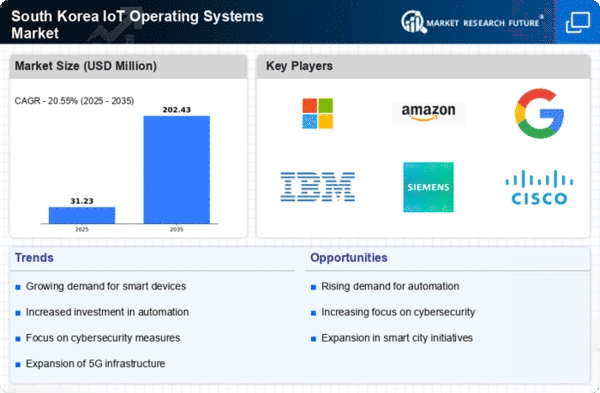Rising Cybersecurity Concerns
The escalating concerns regarding cybersecurity in South Korea are driving the demand for secure operating systems in the iot operating-systems market. As IoT devices proliferate, they become attractive targets for cyberattacks, prompting both consumers and businesses to prioritize security features. Recent surveys indicate that over 70% of South Korean companies consider cybersecurity a top priority when selecting IoT solutions. This heightened awareness is likely to lead to the development of operating systems with enhanced security protocols, such as encryption and secure boot processes. Furthermore, regulatory frameworks are evolving to address these concerns, which may compel manufacturers to adopt more stringent security measures in their operating systems, thereby influencing market dynamics.
Supportive Government Policies
The South Korean government's proactive stance on promoting IoT technology is a crucial driver for the iot operating-systems market. Initiatives aimed at fostering innovation and investment in IoT infrastructure are being implemented, with the government allocating approximately $1 billion to support research and development in this sector. These policies are designed to create a conducive environment for the growth of IoT technologies, including operating systems. By providing funding and resources, the government encourages collaboration between public and private sectors, which is likely to accelerate the development of advanced operating systems tailored for various IoT applications. This supportive framework not only enhances market potential but also positions South Korea as a leader in the global IoT landscape.
Growing Focus on Data Analytics
The emphasis on data analytics in South Korea is emerging as a significant driver for the iot operating-systems market. As organizations increasingly recognize the value of data-driven decision-making, the demand for operating systems that can efficiently collect, process, and analyze data from IoT devices is rising. The market for data analytics solutions is projected to grow at a CAGR of 15% over the next five years, indicating a robust appetite for advanced analytics capabilities. This trend compels operating system developers to incorporate sophisticated data management features, enabling businesses to derive actionable insights from their IoT ecosystems. Consequently, the integration of analytics into operating systems is likely to enhance their functionality and appeal, thereby stimulating market growth.
Technological Advancements in IoT
The rapid evolution of technology in South Korea is a pivotal driver for the iot operating-systems market. Innovations in artificial intelligence, machine learning, and edge computing are enhancing the capabilities of IoT devices. As these technologies mature, they enable more efficient data processing and real-time analytics, which are crucial for IoT applications. The South Korean government has invested heavily in smart city initiatives, which are expected to generate a market value of approximately $2 billion by 2026. This investment fosters the development of advanced operating systems that can support a wide range of IoT applications, thereby driving market growth. Furthermore, the integration of 5G technology is anticipated to facilitate faster and more reliable connections, further propelling the demand for sophisticated operating systems tailored for IoT devices.
Increased Adoption of Smart Devices
The proliferation of smart devices in South Korea significantly influences the iot operating-systems market. With a high penetration rate of smartphones and smart home devices, consumers are increasingly seeking seamless connectivity and interoperability among their devices. According to recent statistics, over 80% of households in South Korea own at least one smart device, creating a substantial demand for operating systems that can manage and integrate these devices effectively. This trend is likely to encourage manufacturers to develop more robust and user-friendly operating systems, which can enhance user experience and drive market growth. Additionally, the rise of wearable technology is expected to further expand the market, as these devices require specialized operating systems to function optimally and communicate with other smart devices.
















